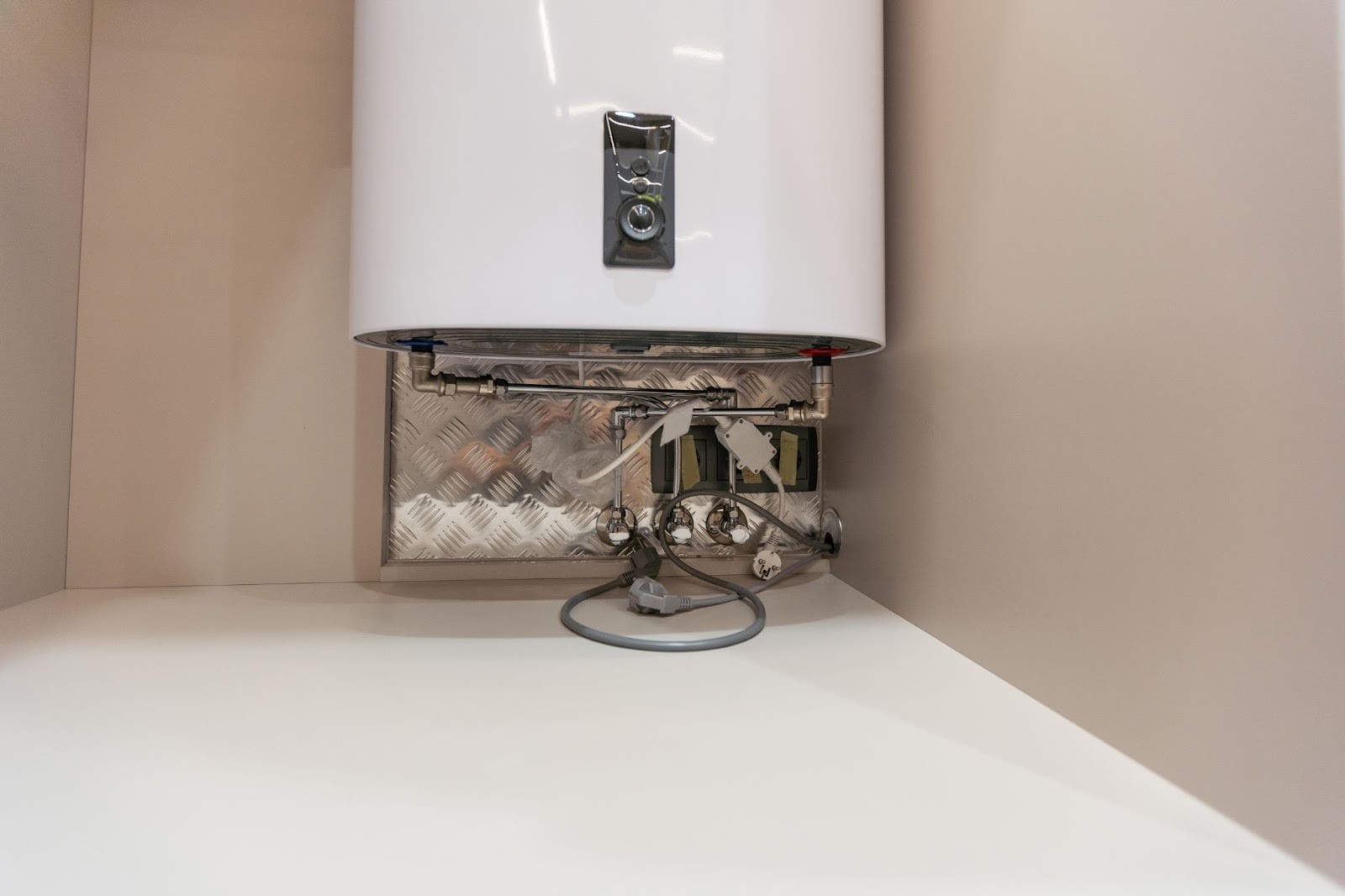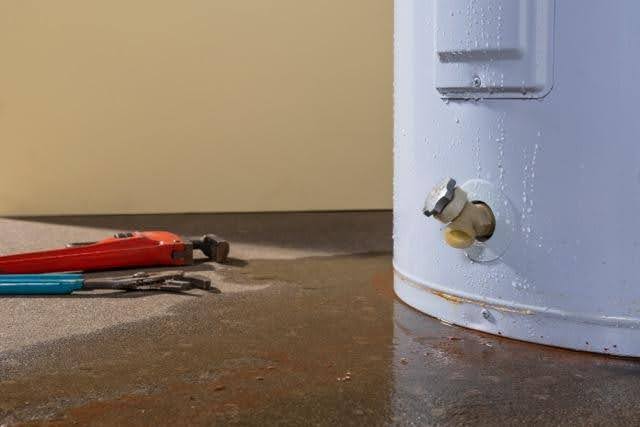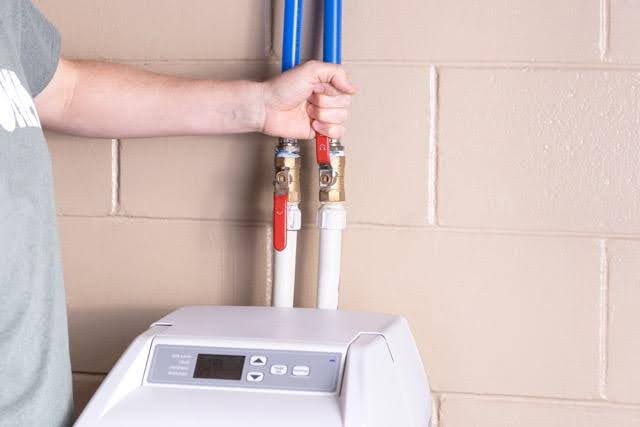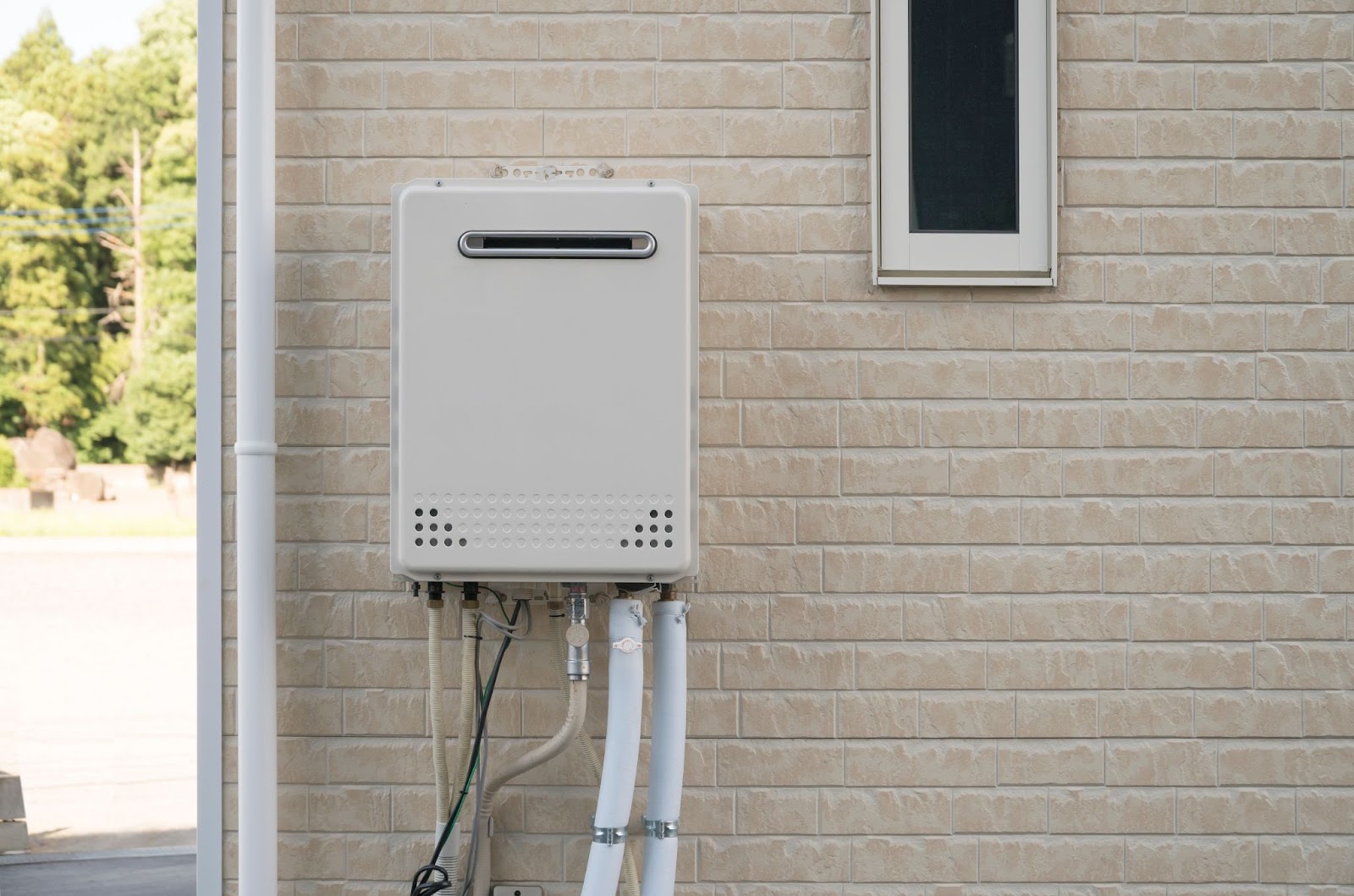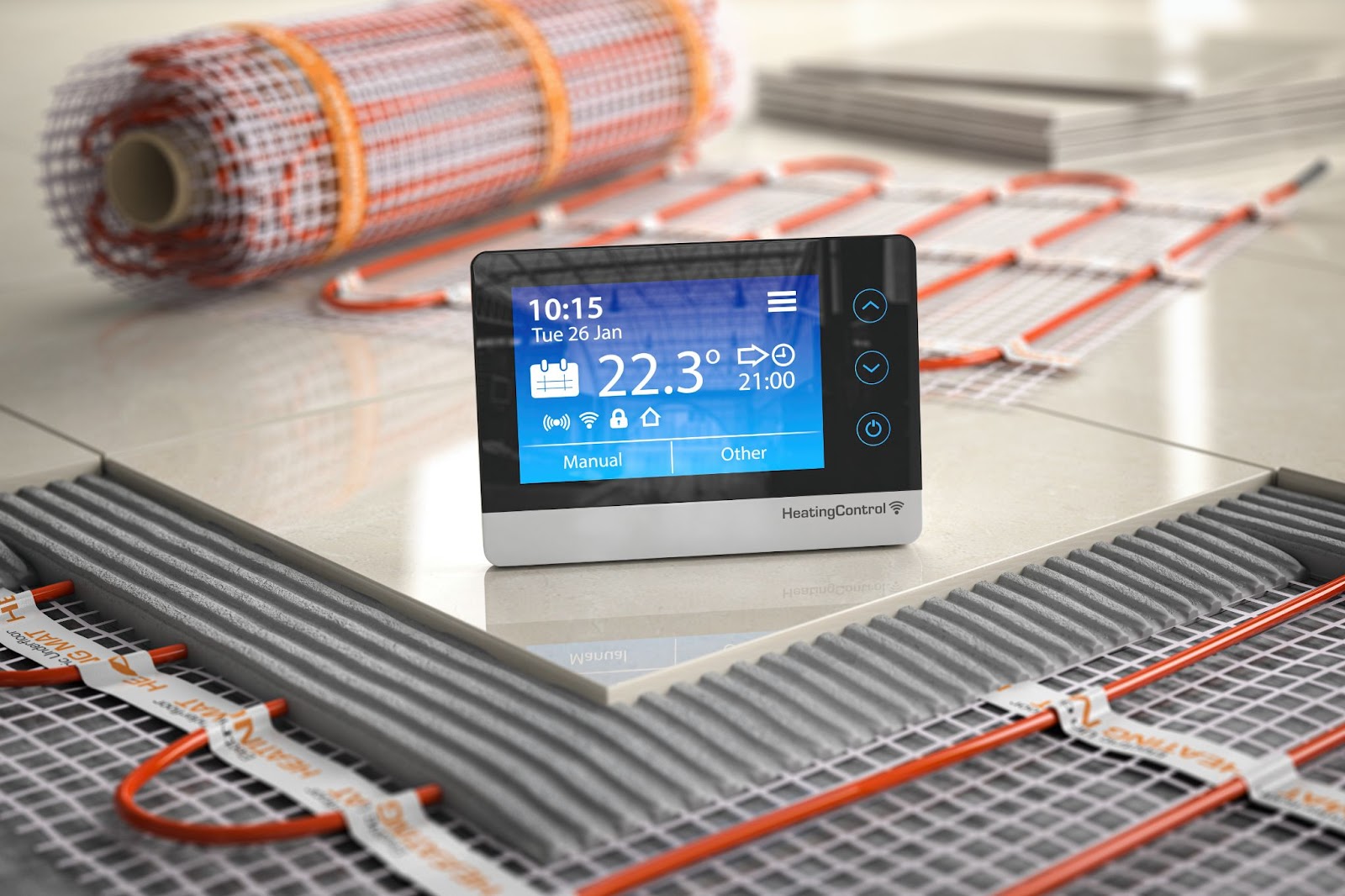A tankless water heater delivers energy-efficient hot water on demand, but hard water could reduce its lifespan if you don’t take the right precautions.
Many homeowners wonder if water softener installation will help protect their system. The answer depends on your water quality, usage habits, and long-term goals.
In this blog, we’ll explain how these water heaters work, what hard water does to them, and how to know if a water softener installation makes sense for your home.
How tankless water heaters work
A tankless water heater operates very differently from a traditional tank system. Instead of storing hot water in a large tank, it heats water only when needed.
When you turn on a faucet or shower, cold water flows through the unit’s heating elements — either electric coils or a gas burner — and comes out instantly hot. This on-demand process means you’ll never run out of hot water the way you might with a tank system.
Because tankless systems don’t waste energy keeping dozens of gallons of water hot all day, they are often more efficient and lower utility bills. They also take up less space, making them an excellent option for smaller homes or families who want a modern upgrade.
However, the efficiency of a tankless system depends heavily on water quality. Without a water softener, hard water minerals such as calcium and magnesium can accumulate inside the unit, reducing its performance and causing wear over time.
That’s why many homeowners consider water softener installation alongside a tankless water heater to maximize lifespan and efficiency.
What hard water does to a tankless system
Hard water contains high levels of minerals that aren’t harmful to drink but can cause serious problems for a tankless water heater over time.
Because tankless systems heat water on demand, minerals pass directly through the heating elements or heat exchanger, leaving behind scale deposits.
As scale builds up, several issues start to appear.
Reduced efficiency
Mineral deposits act like insulation, making it harder for the system to heat water properly. This forces the unit to work longer, wasting energy.
Lower water flow
Scale can clog pipes and narrow water passages, which reduces water pressure and slows delivery.
Inconsistent performance
Homeowners may notice fluctuating water temperatures, longer wait times for hot water, or sudden bursts of cold.
Costly damage
If left unchecked, scale buildup shortens the lifespan of a tankless water heater and increases the need for repairs or premature replacement.
In areas with especially hard water, pairing your tankless system with a water softener is one of the most effective ways to prevent mineral buildup. A professional water softener installation helps protect your investment while keeping your hot water reliable and efficient.

Pros of using a water softener with a tankless water heater
Pairing a water softener with your tankless water heater offers several long-term benefits that improve performance and comfort. By reducing the mineral content in your water, a softener helps your system run more efficiently and last longer.
1. Protects system longevity
Mineral buildup is one of the leading causes of early tankless water heater failure. A water softener installation prevents scale from forming inside the unit, protecting critical components and extending the system’s lifespan.
2. Maintains energy efficiency
Without mineral deposits slowing down heat transfer, your heater operates at peak efficiency. This delivers consistent hot water and helps lower utility bills.
3. Reduces maintenance and repair costs
With softer water running through the system, you’ll need fewer descaling treatments and repairs. This could save hundreds of dollars in maintenance over the unit’s life.
4. Improves overall water quality
The benefits extend beyond your water heater. Softer water feels gentler on skin and hair, helps soaps and detergents work better, and reduces spots on dishes and glassware. It also protects other appliances, like dishwashers and washing machines, from scale damage.
These advantages strongly support adding a water softener to a tankless heater, especially in areas with hard water.
Cons and considerations of adding a water softener
While a water softener installation can be a smart investment for protecting a tankless water heater, it isn’t always the right choice for every household. Here are a few drawbacks and considerations to keep in mind:
1. Higher upfront cost
Adding a water softener means an additional purchase and installation expense on top of your tankless water heater. While the long-term savings often outweigh the cost, you’ll need to budget for both if you live in a hard water area.
2. Ongoing maintenance
Traditional water softeners require salt refills and occasional servicing. This added responsibility may be inconvenient for homeowners who prefer a low-maintenance setup.
3. Space requirements
A softener unit needs space in your utility area or basement. Finding the right spot for a tankless heater and a water softener in smaller homes can be challenging.
4. May not be necessary everywhere
If your home has naturally soft water, installing a water softener won’t provide much benefit. In these cases, routine maintenance and periodic descaling treatments may be enough to keep your tankless system running smoothly.
Understanding these considerations will help you make a more informed decision. A trusted plumber will evaluate your water quality and recommend whether a water softener is right for your home.
How to know if you need a water softener
Not every home requires a water softener, but owning a tankless heater in an area with hard water can make a significant difference. Here are a few ways to determine whether a water softener installation is the right choice for you:
1. Test your water hardness
You can purchase an inexpensive home test kit or request a water quality report from your local utility provider. Water is “hard” when it contains higher levels of calcium and magnesium. If your test shows hardness above 7 grains per gallon (gpg), a water softener is a good idea.
2. Look for signs of hard water in your home
Common symptoms include spots or film on dishes, soap scum in showers, and mineral buildup around faucets. If these issues are present, they’re also affecting your tankless system.
3. Evaluate your water heater’s performance
If your tankless water heater takes longer to heat, produces fluctuating temperatures, or needs frequent descaling, hard water could be the culprit.
4. Consult a professional plumber
An expert can test your water and recommend whether a full water softener, a scale inhibition system, or regular maintenance is best for your setup.
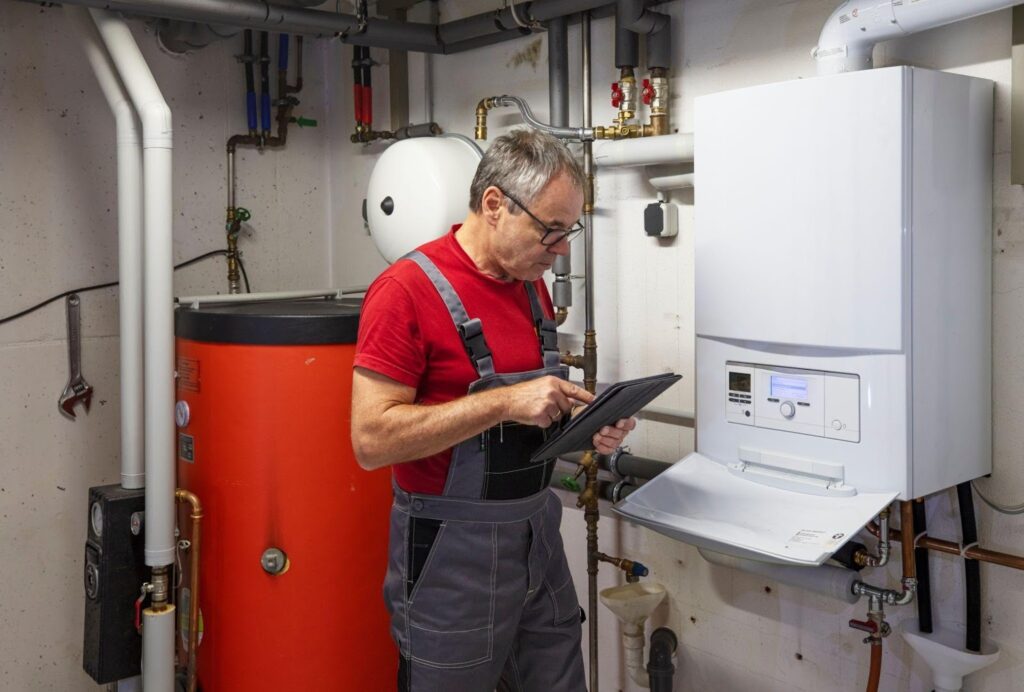
Keep your hot water flowing with Salisbury Plumbing
A tankless water heater is an investment in comfort and efficiency — but it needs proper care to perform at its best. Whether you’re considering water softener installation to protect your system or need expert help with installation and maintenance, the right support makes all the difference.
The team at Salisbury Plumbing has the knowledge and experience to keep your tankless heater running smoothly for years to come. From assessing your home’s water quality to providing full-service solutions, we’ll make sure you get the most from your investment.
Contact Salisbury Plumbing today to schedule service and enjoy reliable hot water daily.


